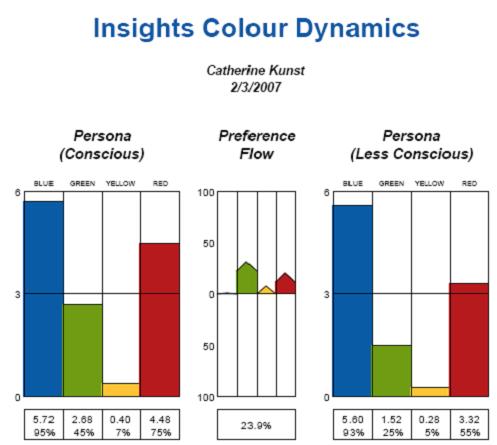Constructive Criticism
I recently had an Insights discovery profile done. I’m a “reforming observer”. This analysis is similar but not identical to having a Myers-Briggs type indicator assessment done. With Myers-Briggs I always come up as an INTJ. The Insights profile does not address the Judging and Perceiving continuum found in Myers-Briggs. Interestingly, on the Insights profile, I almost hit the mid-point between introversion and extroversion as well as the mid-point on sensing and intuition.
Perhaps I’m finally finding some balance.
In this scheme, colors are used to denote behavioral preferences. I lean “blue” and thus by default use logic first. It’s where I’m most comfortable and revert to unless I am focusing on other ways of thinking. “Red” is my secondary color and embodies all things type A and driven. I’ve always had enough ambition for several people. I can’t imagine what someone who is completely “red” dominant is like. Presidential? You can perhaps see that I’m striving hard to improve my “green” nurturing skills. Until I went to business school I never realized how important this was. More work is definitely needed. My fun loving “yellow” extroverted side is just about non-existent. Two of my employees did this at the same time. Both were “blue” dominant but they had much more “green” and “yellow” with less “red” when compared to me. We all lacked “yellow” compared to the other traits. In general “blue” and “yellow” are opposites as are “red” and “green.”
One interesting thing the Insights profile calculates is the dichotomy between your conscious and less conscious persona. Mine are just about equivalent but some of my employees showed much more variability between their public and private selves. One nice feature of this analysis is that a bound report was provided that listed strengths, weaknesses, areas for improvement, recommendations for how to communicate with me and how I could best communicate with others who are not like me. Since my laboratory staff and I are quite similar, it’s easy. But for others who are more extroverted or more comfortable in touchy-feely environments, I need to make an effort to give them what they need.
My profile started like this:
Personal Style Catherine likes to develop models for improving the way to solve difficult problems. She is usually neat, tidy and orderly, both at work and at home. Catherine is an analytical thinker, who prefers to be fully objective in her work. When she does need company it may be difficult for her to reach out to people and to overcompensate for this she may retreat even further into herself. Once committed to an idea or project, Catherine has enormous resolve to carry it through and would like others to share her determination.
<big snip>
Picking up 13 pages later:
Catherine’s possible Blind Spots: Because Catherine often chooses to be alone and single-minded in her efforts, she occasionally neglects to invite others to participate in any of her activities. She is something of a perfectionist, and can be hypersensitive to criticism of her work. Her thinking rationale may be so acutely honed that she will overlook what others tend to care about. Giving in on small items decreases the likelihood of her being seen as too stubborn and controlling. When she makes the effort to adopt a more accepting approach to life and her dealings with others, Catherine will achieve greater acceptance of her innovations.
I love feedback of this type. It’s logical and relatively non-threatening. It provides specific areas to focus on without making you feel like a bad person overall. Most importantly it is actionable. It’s filled with suggestions on what changes my team mates and I can make to help us interact more productively.
Compare this to a typed note I found in my mail-box at work last week.
You have not impressed anyone here with your:
I can only say ouch. Granted things at my work are currently a bit turbulent. Major changes are underway. I alluded to the coming storm here and here. These changes are finally public for which I am privately rejoicing. My research institute, which has been located about 5 miles north of the university, is moving to campus and the building we are currently in will be sold. To some of us (those moving) this is great news, a cause for celebration. The down side is that several of the labs are not being moved. Those people, who must find new employment, are understandably unhappy as their futures are uncertain. As the acting director of our research institute, I am the target for their unhappiness.
I showed this note to my former boss and mentor who is one of the scientists moving to campus. He was as perplexed as I by some of the comments, wondering for example who else would consider themselves a mentor of me. He does not feel stabbed in the back. Today he made a comment that perhaps whoever wrote that note simply could not understand the limitations of the job. Since he filled these shoes for several decades, not many have had opportunity. After about a week on the job I learned my mistake, apologized and tried to share my revised understanding with our colleagues. But perhaps, like so many things, it can only be understood by walking in someone else’s shoes.
